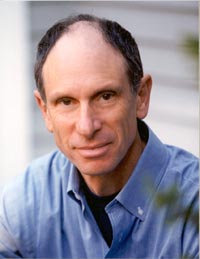Joseph Goldstein quotes
Jump to navigation
Jump to search
Joseph Goldstein (1944 - ) is one of the first American vipassana teachers, co-founder of the Insight Meditation Society (IMS) with Jack Kornfield and Sharon Salzberg, contemporary author of numerous popular books on Buddhism (see publications below), resident guiding teacher at IMS, and leader of retreats worldwide on insight (vipassana) and lovingkindness (metta) meditation.
Quotes
- The commitment to morality, or non-harming, is a source of tremendous strength, because it helps free the mind from the remorse of having done unwholesome actions. Freedom from remorse leads to happiness. Happiness leads to concentration. Concentration brings wisdom. And wisdom is the source of peace and freedom in our lives.
- Guilt is a manifestation of condemnation or aversion towards oneself, which does not understand the changing transformative quality of mind.
- On the deepest level, problems such as war and starvation are not solved by economics and politics alone. Their source is prejudice and fear in the human heart; and their solution also lies in the human heart.
- Having been through both of those other stages, our mind matures to a place where it is no longer moved: it does not grasp at pleasant things; it is not repelled by unpleasant things. Our mind attains deep, deep balance, like a calm, deep-flowing river. Out of this mature place of equanimity, the conditions arise that open our mind suddenly to the unconditioned, to what is beyond body and mind, to freedom.
- We often mistakenly assume that because someone has genuine understanding in one particular area, this mastery necessarily extends to all other areas of life. That may or may not be true.
- I have no parents I make the heavens and earth my parents I have no home I make awareness my home I have no life or death I make the tides of breathing my life and death I have no divine power I make honesty my divine power I have no friends I make my mind my friend I have no enemy I make carelessness my enemy I have no armor I make benevolence my armor I have no castle I make immovable-mind my castle I have no sword I make absence of self my sword.
- Every time we become aware of a thought, as opposed to being lost in a thought, we experience that opening of the mind.
- If we try to practice meditation without the foundation of goodwill to ourselves and others, it is like trying to row across a river without first untying the boat; our efforts, no matter how strenuous, will not bear fruit. We need to practice and refine our ability to live honestly and with integrity.
- In the second training, we develop energy, concentration, and mindfulness. These are the meditative and life tools that enable us to awaken. Without them we simply act out the patterns of our conditioning.
- Wisdom is the clear seeing of the impermanent, conditioned nature of all phenomena, knowing that whatever arises has the nature to cease. When we see this impermanence deeply, we no longer cling; and when we no longer cling, we come to the end of suffering.
- Generosity, love, compassion, or devotion do not depend on a high IQ.
- We all know people who become strongly identified with, and attached to, their intelligence. It can become a big ego trap, harmful to oneself or others. Intelligence can also be a great blessing, providing invaluable clarity.
- Imagine holding on to a hot burning coal. You would not fear letting go of it. In fact, once you noticed that you were holding on, you would probably drop it quickly. But we often do not recognize how we hold on to suffering. It seems to hold on to us. This is our practice: becoming aware of how suffering arises in our mind and of how we become identified with it, and learning to let it go. We learn through simple and direct observation, seeing the process over and over again until we understand.
- We establish some stability and focus in our mind and see which elements in it lead to greater peace, which to greater suffering. All of it both the peace and the suffering—happens lawfully. Freedom lies in the wisdom to choose.
- Is enlightenment gradual or is it sudden? Whole schools of Buddhism have grown up around this issue. But it has always seemed to me that liberation is both sudden and gradual, that there is no polarity between the two.
- Unless a practice cools the fires of greed, aversion, and ignorance it is worthless.
- Our mind becomes more spacious, more open, and happier as we move past our avoidance and denial to see what is true.
- The Pali word parami refers to ten wholesome qualities in our minds and the accumulated power they bring to us: generosity, morality, renunciation, wisdom, energy, patience, truthfulness, resolve, lovingkindness, and equanimity.
References
- The Experience of Insight (1983)
- Seeking the Heart of Wisdom (1987), with Jack Kornfield
- Insight Meditation: The Practice of Freedom (1994)
- Path of Insight Meditation (1995), with Jack Kornfield
- Insight Meditation: A Step-By-Step Course on How to Meditate (2002), with Sharon Salzburg [Sounds True]
- One Dharma: The Emerging Western Buddhism (2002)
- A Heart Full of Peace (2007)
